#serbian quotes
Explore tagged Tumblr posts
Text
"Nobody will ever hug you this tightly,
all perturbed and pale.
I’m a sailor without a compass
whose ships always go crazy.
Nobody will ever
pour an entire last tenderness
into your bloodstream
like this,
nor find both hope and hopelessness inside of you.
Never again will you rot so wonderfully
in a common hotel,
yet not wish to get out of it.
You are the tastiest blood of this world
that I sponged with the bread
of my dark belly.
You are the salt from swollen lips
that we peeled off with our fangs
and spilled over my thighs
and your breasts.
You are the most infinite,
the deadliest sky
next to my rosy ear.
The most shameless girl
among all the women I've ever met.
The shiest woman
among all the girls I've ever met..."
— Miroslav Mika Antić, a fragment of "A Little Rocky Nocturne". Translated by me.
#Mika Antić#Literary translation#Serbian poetry#poetry in translation#Miroslav mika antić#literature#Poems#Poem#Poetry#Quotes#Art#Serbian quotes#Serbian literature#serbian poet#Mali kameni nokturno#English translation#Translation#A little rocky Nocturne
6 notes
·
View notes
Text
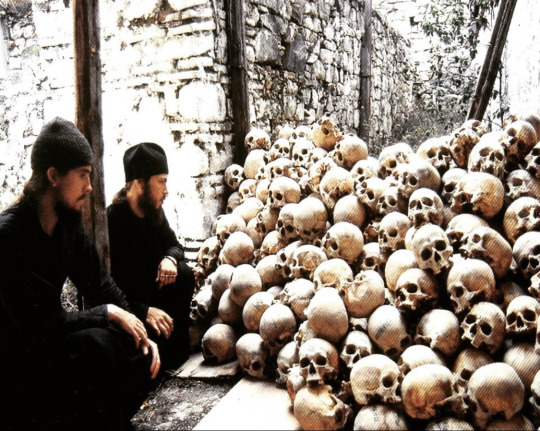
“After sin comes shame; courage follows repentance.
Satan upsets the order; he gives courage to sin and shame to repentance.”
+ St. John Chrysostom
#another banger from st. john chrysostom#orthodox christianity#eastern orthodox#eastern orthodoxy#christianity#orthodox#orthodoxy#greek orthodox#church#orthodox church#serbian orthodox#christian quotes#quotes#st. john chrysostom
369 notes
·
View notes
Text
Julius: you're called The Third Parent but you should be called The Third Wheel™ because you get no bitches, Tommy, you know? :)<3
Tommy: if I'm Tommy Taffy the Third Wheel™ then you better start being called Julius the Cuckold™
Julius: ... Yeah well..YOU HAVE UGLY TEETH, ASSHOLE FUCK FACE!
Tommy: NO, YOU HAVE UGLY TEETH, RAZOR MOUTH BITCH BOY!
Julius: >:u
Tommy: >:[
Y/N: ...i thought you two were supposed to be scary but OH MY GOD you're actually just dramatic barbie ass bitches WAHAHAHAHA😂🤣
Tommy, looking at Julius: kill y/n together, brother?
Julius, nodding: hell yes, brother.
Y/N: *jumps out the window like Milos*
I apologize for nothing. Enjoy my Tommy Taffy posting or go cry about it.
#tommy taffy#the third parent#julius the dressmaker#julius doherty#creepypasta#nosleep#incorrect creepypasta#incorrect creepypasta quotes#creepypasta x y/n#a Serbian film reference (the window jump)
6 notes
·
View notes
Text
somethign that pisses me off about every video talking about a serbian film i've seen is that even those who bring up the intro do NOT bring up just how good of a father Milos is and how well he handles the situation of a child discovering sex while still too young. Like it really hammers home how Milos is just A Good Guy(tm).
#luly talks#he loves his family :)#a serbian film#i cant quote it bc i dont remmeber it its been like a year or two since i watched it but like.#usually you'd expect parents to try HIDE the concept of sex from children even getting MAD but he (AND HIS WIFE!! her too)#just deal w it like adults being like ah those were daddy's friends dont worry :)#like theyr'e just very open and responsible parents yknow.
14 notes
·
View notes
Text









This latter was a handsome young man with fine features. He could be mistaken for a Caucasian highlander, and in his general appearance he came closest to such a type. Insanely brave, he had been twice severely wounded and lived in Niš for treatment. He was burdened with idleness, but they did not want to give him command of even a battalion, because they feared that he would ruin it and himself. Prince Alexander was the exact opposite of his brother. He was not as handsome as George, marred by his spectacles and slouching shoulders. He was as secretive and reserved as George was impetuous. Events came to pass in such a way that the Prince soon found himself in a position of responsibility. He became heir by unnatural means. The example of his brother was always before his eyes. He early began to be self-aware and developed self-constraint and concealment.
Grigory Nikolaevich Trubetskoy
#wildfieldz edits#wildfieldz aesthetics#serbia#yugoslavia#kraljevina srbija#kraljevina yugoslavija#alexander of serbia#alexander of yugoslavia#alexander karageorgievich#aleksandar karadjordjevic#aleksandar od yugoslavije#george of serbia#djordje karadjordjevic#serbian royal family#kingdom of serbia#historical quotes
1 note
·
View note
Note
can you pleaaaaase translate the tags in balkan on the purple haired lee know set? the crowd is on the edge of their seat
IN BALKAN is sendinggggg me omg but ofc babe these ones aren’t even bad i can share confidently. *clears throat* so. the tags are as follows:

so first of all lutka means doll (feminine form) which i LOVE calling people in croatian men specifically. but anyway loš by breskvica is this song right here
just to paint the picture. the specific lyrics i chose ‘a ja bi da ti igram cele noći / mirišem ti na killian crne oči’ means ‘i want to dance for you all night / smell like killian / black eyes’ but the way it’s phrased is like ‘i smell like killian to/for you’ but idt he wears killian idk he smells like but to be honest it could be febreeze fuck if i care. ‘ti nisi fin bebe’ means ‘you’re not nice baby/babe’ which. self explanatory all of this tbh iykyk 🫶🏻
then loša by breskvica:
and the only lyric i mentioned was ‘zmija balkanska’ which means ‘balkan snake’ which <33 but tbh this song is kinda me in general. also loš = bad (male form) and loša = bad (feminine form) hope that helped!
#also idk but in case you might need it we speak multiple languages in the Balkan region! mine��s croatian and eg in serbia they speak#serbian and then in Bosnia it’s bosnian and so on you get the gist#though we can understand each other (not every Balkan country but these ones specifically yes) they’re still very much distinct languages!#jsyk hehe so i’ll mostly always be using croatian in these tags unless im quoting Serbian lyrics you know how it is
5 notes
·
View notes
Text
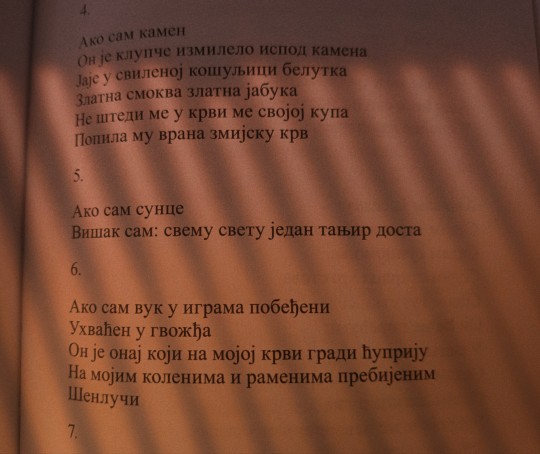
5.
And if I'm the sun
I'm redundant: one plate is enough for each and all.
Boško Suvajdžić, "Ako sam ja vuk" ("If I am a wolf")
10 notes
·
View notes
Text
That gentle youth’s suggestion that he might someday see me enrolled as a student at Princeton kept ringing in my ears, and sounded like mockery. A peasant boy from a Serb village who a little over two years previously was wearing a peasant’s sheepskin coat and cap to become a fellow student of those youths who looked like young aristocrats seemed impossible. A European aristocrat would never have suggested such a thing, and that puzzled me.
--Physicist Mihaljo "Michael" Pupin, in the Buffalo Evening News, December 4, 1924, on a chance encounter with a Princeton student in 1875
#Princeton#1870s#aristocracy#immigrants#Serbian#PrincetonU#Princeton University#quote#Princetonquote
3 notes
·
View notes
Text
2 things;
i feel like shit. 1 hour crying = free noko🐼 makeup (i;m not even going to fix my makeup i'll just go out like this. who tf cares)
i finished the witcher s1 yay. geralt (passed out for 99% of the episode) my sole support
#it's interesting because considering the pace i'd guess season 3 should cover what's in the game but i could be wrong since i have no idea#of the length of plot geralt + ciri at kaer morhen would cover#btw are witchers like .. immortal#oh and i also wonder if you can get the black eyes in the game from some potion..ive not tried much alchemy yet#ANY way this week is just really not it and i feel like shit and am so pissed. honestly geralt saved me somewhat but i am sooooo pissed#and sleep deprived#to quote a random ass essay i found in an 1998 anthology among my library's throwaway books#those who steal your time are murdering you#and the bitch at the ..how tf do you say salter in english#ho0nestly im too tired for this#like i understand somewhat because working at a salter is certainly not my dream#but still fuck off#every day im one step closer to becoming a karen. and they would deserve it. but unfortunately i dont have it in me#i dont know enough swear words in serbian#*you know what? no. she's not valid to be a bitch for no reason even if she hates her job. what's that got to do with me
0 notes
Text
Do good to those who wish to argue with you, and you will win the argument.
One deed of compassion will bring the madman to his senses and will pacify the embittered man more quickly than many hours of conversation.
☦︎ Saint Nikolaj Velimirovich
#serbian orthodox#orthodox christianity#orthodoxy#eastern orthodox#eastern orthodoxy#orthodox#christianity#christian quotes#quotes
29 notes
·
View notes
Text
In a crossover no one asked for:
Vukmir: It's a pleasure to shake the hand that has jerked such a big cock.
Killian: You should feel honored and be thanking me.
[vukmir - a Serbian film; Killian Lynch - Hellcrew and creepypasta]
*that's an actual line of Vukmir's in ASF
#incorrect quotes#a serbian film#killian lynch#vukmir a Serbian film#creepypasta incorrect quotes#incorrect creepypasta quotes#julius the dressmaker#thehellcrew#Julius Doherty
38 notes
·
View notes
Text
Been thinking about this quote from Mira Furlan's autobiography (For context, Mira Furlan was an actress, known by many as Delenn on Babylon 5, who fled Yugoslavia during the Yugoslav wars in the 90s and narrowly escaped to the U.S.) "Why does an emigrant continually make mental lists of those "special people" who helped him in times of distress? Why does this not occur so prominently in lives that are "normal," unbroken? Is it because the vulnerability of your situation puts you in a place where you suddenly NEED help? From your comfortable life, you're abruptly launched into a void where nothing and nobody awaits you. It's like being suddenly stripped naked in the midst of a crowd. It's like losing your voice in the middle of a theatre production. It's like everyone dear to you dropping dead at once and leaving you alone, surrounded only by foreign, indifferent faces. Sudden change from somebody to nobody sharpens your senses so that those rare good, compassionate people almost glow in the darkness of your new, bleak world. That's why the emigrant experience is so valuable in the end, despite all its hardship. It makes you see more clearly. It makes you recognize without a doubt the good people around you. And those have been and will always be very few, even in "normal" circumstances. The only difference is that now, in this new life of yours, you KNOW this with absolute certainty." . . . "In general, though, people in America would "help" by making one or two phone calls and disappearing from our lives if those phone calls didn't produce a result. In general, people were indifferent to our "situation." Americans prefer simple stories with clear separation between the "good guys" and the "bad guys." Where did "our story" fit? A new history was being created. Nationalism in Croatia was dismissed as a necessary by-product of Serbian aggression. We, the victims of the fascist tendencies of the "good guys," were just too complicated to even try to understand. Not only America, but the world needs simple stories. And to create those, truth is most often sacrificed." - Mira Furlan, Love Me More Than Anything In The World
#Mira Furlan#quotes#text#babylon 5#I'm not really sure how to tag this tbh#I just find myself reflecting on some of the thing's she's written about lately#especially with all the stuff going on in gaza#I wonder how much I can do to actually help with that#beyond circulating information and such#If I'm complicit in some way by not doing more#trying harder#while trying to still be fair to myself and what I can reasonably do#deep sigh
34 notes
·
View notes
Text
youtube
written by: me soft: fl studio
January the 17th. Friday. Had lessons in the morning. Had breakfast with Papá, aunt Ella, Alexander P of Serbia (Elena's brother, Ioannchik's brother-in-law) and Kostya.
Grand Duchess Tatiana's diary entry, 1913
It was also reported that he intended to make the Grand Duchess Tatiana, the late Czar's eldest daughter, his wife, and from whom the pitiless Red executioners separated him forever. As a result of their attachment he is often referred to as the protector and friend of the Russian refugees.
New York Times on Prince Alexander's alleged engagements
#wildfieldz music#selfmade music#instrumental music#fl studio#the romanovs#serbian royal family#grand duchess tatiana#tatiana nikolaevna#tatiana romanov#alexander karageorgievich#aleksandar karadjordjevic#aleksandar od yugoslavije#historical quotes#tatiana x alexander#the ultimate otp#i said what i said
1 note
·
View note
Text
📝ENG Translation: Joker Out in Helsinki
Article written by L.P./Promo, published on Croatian website tportal on 4.3.2024, English translation by @moonlvster and IG ireena25_, Proofread by IG GBoleyn123.
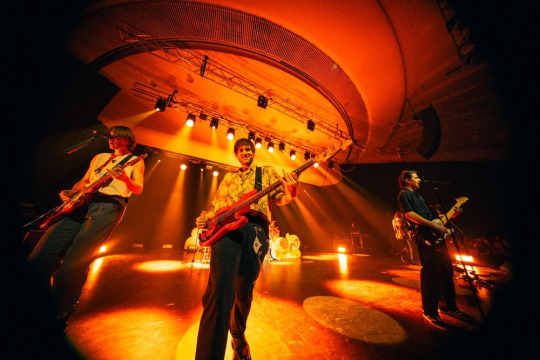
PHOTO: Vita Orehek
Joker Out played two unreleased songs in Helsinki – and it caused complete uproar!
The band Joker Out began their big European 'See You Soon' tour with two sold out concerts in Helsinki.
The Finnish audience, besides having the honour of opening the band's new tour, recieved a special gift they weren't expecting – the first performance of two completely new songs that caused an unseen hysteria in the fans! The effect was even stronger because both of the songs are in Serbian and most of the audience didn't understand a single word.
"We performed two unreleased songs for the first time in Helsinki – 'Šta bih ja' ('What would I') and 'Bluza' ('Blouse'). It's not necessary to point out that Finns don't understand the Serbian language, but the reaction was as though we were playing our absolute most popular songs. We were just looking at each other and smiling. When we returned to our hotel we saw that the reaction online was the same as the one we had experienced at the concert. A group of our fans at JokerOutSubs even activated and translated both of the songs into English using video recordings. Commenters on social media are asking us to release the songs, but they will have to wait a little because we are going to record them after the tour." – stated the band enthusiastically.
In mid-February Joker Out released their new single 'Everybody's Waiting', the sucessor of their amazing 'Sunny Side Of London'. They are going to, together with 'Šta bih ja' and 'Bluza' (which is currently a working title), be featured on the band's next studio album.
Joker Out sold all the tickets for the House of Culture in Helsinki, which means there were more than 3000 fans there. Ahead of them is a long tour that continues tommorow in Tallinn, and then in Riga, Vilnius, Krakow, Berlin, Leipzig, Malmö and many more cities. This tour, called 'See You Soon', encompasses 13 countries, including France, Belgium and Italy for the first time, with 22 concerts in some legendary, world-famous concert venues, for example, the O2 Shepherds Bush Empire.
Some of their festival appearences have also been announced, which include Sea Star Festival (23rd-26th May, Umag, Croatia), EXIT (10th-14th July, Novi Sad, Serbia) and Sziget (7th-12th August, Budapest, Hungary), at which the local fans will have the chance to hear 'Everybody's Waiting', 'Šta bih ja' and 'Bluza' live for the first time!
❗ DO NOT REPOST, and if you quote, please link back to this article.
#joker out#jokeroutsubs#bojan cvjetićanin#kris guštin#jan peteh#nace jordan#jure maček#heyyy we got noticed by the senpais!! 😆😆😆
63 notes
·
View notes
Text
♀️latscho diwes djuviale♀️
💞 I made this blog to highlight the specific struggles Romani women face based on our sex, our race and our class
💞 I'm anti-gender, anti-sex trade, anti-religion, anti-capitalist
💞 I support women's and LGB rights. My feminism is female only!
💞 I'm a half-sinti, half-white working class homosexual woman living in Western Europe
BEFORE YOU BLOCK ME, READ THIS: x
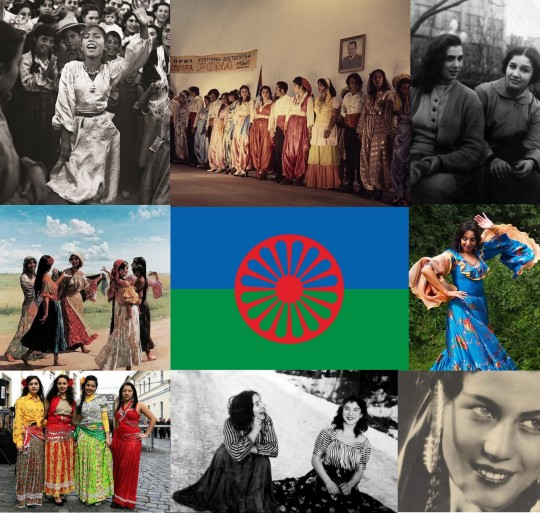
FAQ, BOOKS AND RESOURCES BELOW
General / Frequently asked questions
-> Difference between Roma and Romanian (x)
-> Difference between Roma and Sinti (x)
-> My profile picture is from De la source à la mer (1984), by Sinti-Manouche filmmaker and writer Pisla Helmstetter
-> My banner is from The Gypsies are Found Near Heaven (1975), by Emil Loteanu
Posts on the racialized misogyny targeting Romani women
-> general masterpost (x)
-> posts on Romani women being sex trafficked into prostitution in Europe (x) (x)
-> posts on the forced sterilization of Romani women in Europe (x) (x) (x) (x)
-> post on healthcare discrimination (x)
-> incest, sexual and domestic violence targeting Eastern European Romani women (x) (x)
-> Roma, religion and misogyny (x)
-> On "Gypsy witches" (x)
Inspiring Romani women you should know about
-> autobiographies by Romani women (x)
-> Sandra Jayat, French-Romani painter and poet (x)
-> Katarina Taikon, Swedish-Romani writer and antiracist activist (x) (x)
-> Elena Gorolova, Czech-Romani women's rights advocate (x)
-> Jelena Savić, Serbian-Romani feminist, poet and essayist (x)
-> Tela-Tchaï, French-Romani actress (x)
-> Amoun Sleem, Palestinian-Domari antiracist activist and feminist (x)
-> Philomena Franz, German-Romani Holocaust survivor and writer (x)
-> Vera Kurtić, Serbian-Romani lesbian feminist (x)
-> Kiba Lumberg, Finnish-Romani and butch lesbian artist (x)
-> Zilli Schmidt, German-Romani Holocaust survivor (x)
-> "15 Bad ass Romani ladies you should know about" (x)
-> Romani herstory, an "ever-growing digital library that celebrates women of Romani descent from the past and present, unsung heroines & trailblazers who refuse(d) to conform to stereotypes"
Romani feminist writings
-> Intersections of Gender, Ethnicity, and Class: History and Future of the Romani Women’s Movement, by Jelena Jovanović, Angéla Kóczé, and Lídia Balogh (x)
-> Gender, Ethnicity and Class: Romani Women's Political Activism and Social Struggles, Angéla Kóczé (x)
-> Lessons from Roma Feminism in Europe: Digital Storytelling Projects with Roma Women Activists from Romania, Spain and Sweden, Jasmine Ljungberg (x)
-> Romani women’s identities real and imagined: Media discourse analysis of “I’m a European Roma Woman” campaign, Jelena Jovanović (x)
-> Džuvljarke: Roma Lesbian Existence, Vera Kurtić (x)
-> Re-envisioning Social Justice from the Ground Up: Including the Experiences of Romani Women, Alexandra Oprea (x)
-> Angéla Kóczé on the hijacking of the Romani feminist and antiracist movement by neoliberal groups (x) (x)
-> Mihaela Drăgan on the racialization of Romani women (x)
-> quotes from Romani feminist books (x)
Learn about the Romani genocide
-> general post (x)
The Genocide and Persecution of Roma and Sinti. Bibliography and Historiographical Review (x)
Roma Resistance During the Holocaust and in its Aftermath, Angéla Kóczé, Anna Lujza Szász (eds.) (x)
O Porrajmos: the Romani Holocaust, Ian Hancock (x)
Porrajmos: The Romani and the Holocaust, Ian Hancock (x)
Responses to the Porrajmos (the Romani Holocaust), Ian Hancock (x)
Barvalipe Roma Online University (playlist of lectures about many different aspects of Romani history, politics and culture) (x)
Romani slavery in Romania
Brief overview (x)
Alternatives to the labrys flag
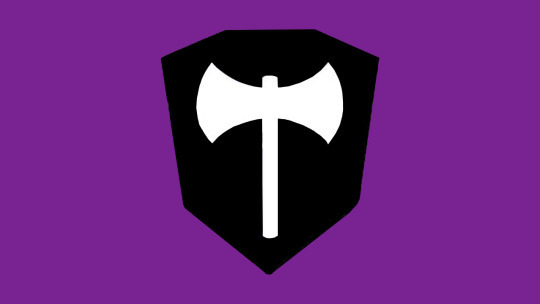
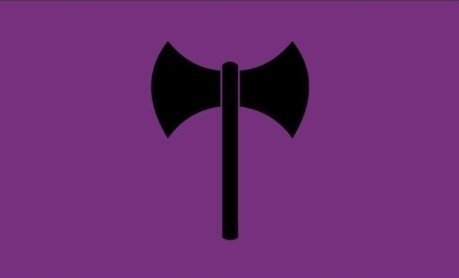
(first design by @/sapphos-darling)
362 notes
·
View notes
Text
Russian dictator Vladimir Putin continues to demonstrate that he is not interested in negotiating a ceasefire and remains focused on the total destruction of Ukraine, the Institute for the Study of War (ISW) wrote on Oct. 31.
This conclusion was drawn after Serbian President Aleksandar Vučić's interview with Bloomberg on Oct. 30, in which he recalled his recent conversation with Putin and an attempt to discuss with him Russia's war against Ukraine and the possibility of a ceasefire. However, the Russian dictator made it clear that Russia would continue to pursue its goals in the war.
"All the goals of the special military operation, as he put it, will be achieved," Vučić quoted Putin.
The ISW stresses that these goals outlined by Putin ultimately mean the destruction of the Ukrainian state and government. He had previously rejected any ceasefire agreement during a press conference with Hungarian Prime Minister Viktor Orban in July 2024, claiming that it would allow Ukraine to regroup and rearm.
A hypothetical ceasefire under the current circumstances would only benefit Russia, giving Moscow time to further radicalize and militarize Russian society against Ukraine, as well as allowing the Russian army to rest and recover before possibly launching a new attack in the future.
The ISW also reported on the continuing Russian offensive in the Kupyansk, Svatove, Pokrovsk, Kurakhove, and Vuhledar sectors of the front. Russian troops have advanced southeast of Kupyansk and west of Svatove, as well as along the Kupyansk-Svatove-Kreminna line. Footage published on Oct. 31 also indicates advances in Stelmakhivka and Kruhlyakivka villages, suggesting that the Russians have likely captured these areas.
At the same time, Ukrainian forces have regained positions in a wooded area southwest of Pobeda, southeast of Kurakhove.
There are also indications that Russian troops may have captured Novoukrainka, northwest of Vuhledar. The ISW has geolocation-confirmed footage showing the Russian 40th Marine Brigade advancing into the central part of Novoukrainka.
While Russian sources claim to have captured Yasna Polyana, northwest of Vuhledar, the ISW has no evidence to support this claim.
12 notes
·
View notes